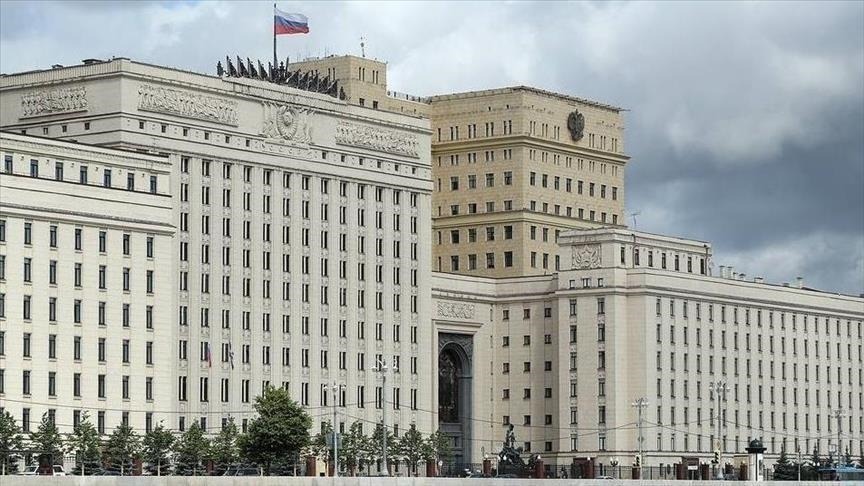Western companies have lost a large market in Russia and are incurring huge losses because of the sanctions imposed by their governments, according to the head of Russian state-owned defense firm Rostec Corporation.
In an interview with Anadolu Agency, Sergey Chemezov said Russia has become another country on the long list of nations targeted by “the architects of sanctions.”
Moscow, he said, is facing a “well-planned war” that aims to obliterate Russia’s financial, industrial, culture and sports sectors, as well as its citizens.
“This war did not start today. Over the years, we have seen them searching for pretexts for more and more new sanctions, restrictions, and other openly hostile actions,” he said.
“But the current restrictions are truly unprecedented.”
Describing sanctions as “actions far from common sense and justice,” Chemezov emphasized that they undermine the principles of free trade and trust, discrediting Western economic and political institutions.
“Today, Russia is being targeted. Tomorrow, the target may be any other country that holds an independent position in world politics,” he warned.
He compared Moscow’s predicament with what Ankara faced over the deal for the S-400 air defense system, pointing out that Türkiye was the only NATO member ostracized for acquiring a Russian defense product while other allies have also done the same.
On the pretext of partnership, the West tried to deprive Türkiye of its right to protect itself, he said.
In Russia’s case, he added, they are trying to exclude Moscow from “international business processes and limit its technical development.”
Blinded by its hate for Russia, the West is “ready even to give up its unshakable principles of economic pragmatism,” Chemezov said.
“Partnerships that were beneficial not only for Russia, but also our partners abroad, are being destroyed,” he lamented.
– Winners or losers?
Chemezov asserted that “Western suppliers have lost a large market” in Russia.
“For the long term, if not forever, they have lost the chance to supply their products (to Russia) and are suffering significant losses due to decisions taken by their authorities,” he said.
Acknowledging that Russia has been experiencing some difficulties, he said the problems were “nothing fatal,” adding that the situation has also opened “a window of opportunity.”
To an extent, sanctions have proven to be a boon for Russia, particularly for the development of local industries, he said.
He said Moscow is now producing an array of goods that it was previously importing from around the world.
“Among other things, we now make components for the automotive industry, aircraft construction and electronics,” he said.
According to Chemezov, sanctions may prove to be more painful for Western producers in the aviation sector than for Russia.
“That is because some products were made specifically for Russia, meaning there are no other buyers and they will just have to be discarded,” he explained.
Moscow, he emphasized, will “find ways to ensure that all foreign-made aircraft in the fleets of Russian airlines remain operational.”
He said Russian carriers have about 150 locally made Sukhoi Superjet aircraft, with 20 more planes coming into service this year.
From 2024 onward, the United Aircraft Corporation (UAC), a Russian aerospace and defense corporation, will deliver over 20 Superjets annually, he added.
“Add to this the MS-21, Tu-214, Il-114. All these planes are in a high state of readiness. In the coming years, the plan is to deliver over 110 jetliners of various types by 2025 and more than 500 by 2030,” said Chemezov, stressing that key components of these aircraft are being made in Russia.
Russia will move step-by-step and rise to all these challenges, he added, citing as an example the composite wing for the MS-21 plane that is now made solely with local materials after international supply was halted.
Chemezov said Rostec, which handles nearly 40% of the country’s defense orders, fully understands its “big responsibility” and has been working dedicatedly to deliver everything necessary for Russia’s defense capabilities.
On the possibility of acquiring companies leaving Russia, Chemezov said such moves could be considered if they “will contribute to solving priority requests of the state.”
Speaking about financial sanctions, Chemezov said Rostec started to move away from the use of dollars long ago, switching to more flexible payments in rubles and national currencies.
There may have been doubts about our decision at first, but “time has shown it was strategically the right thing to do,” he said.
Russia, he added, has become “the flagbearer of the rejection of the dollar’s monopoly and Western payment systems.”
“Now many countries have followed our example and started an active transition to using national currencies in order to ensure their financial security,” he said.
– ‘No more illusions’ about West
Russia has “no more illusions” about its partnership with Western countries, said Chemezov, adding that their “level of hypocrisy makes restoring trust an almost impossible ask.”
“However, there are other countries with whom our relationships based on mutual trust have lasted for many years, and these partnerships will only strengthen,” he said.
“We know the value of words – that is our fundamental difference with the West, where they say one thing today and may act completely differently tomorrow.”
About sanctions imposed on him, Chemezov said he views them as “a personal reward” and proof that he is doing something right for Russia.
“I have been under personal sanctions since 2014. I take it … as a personal reward. For me, this is evidence that my efforts are not in vain and Rostec is successfully contributing to Russia’s progress,” he said.
-AA

